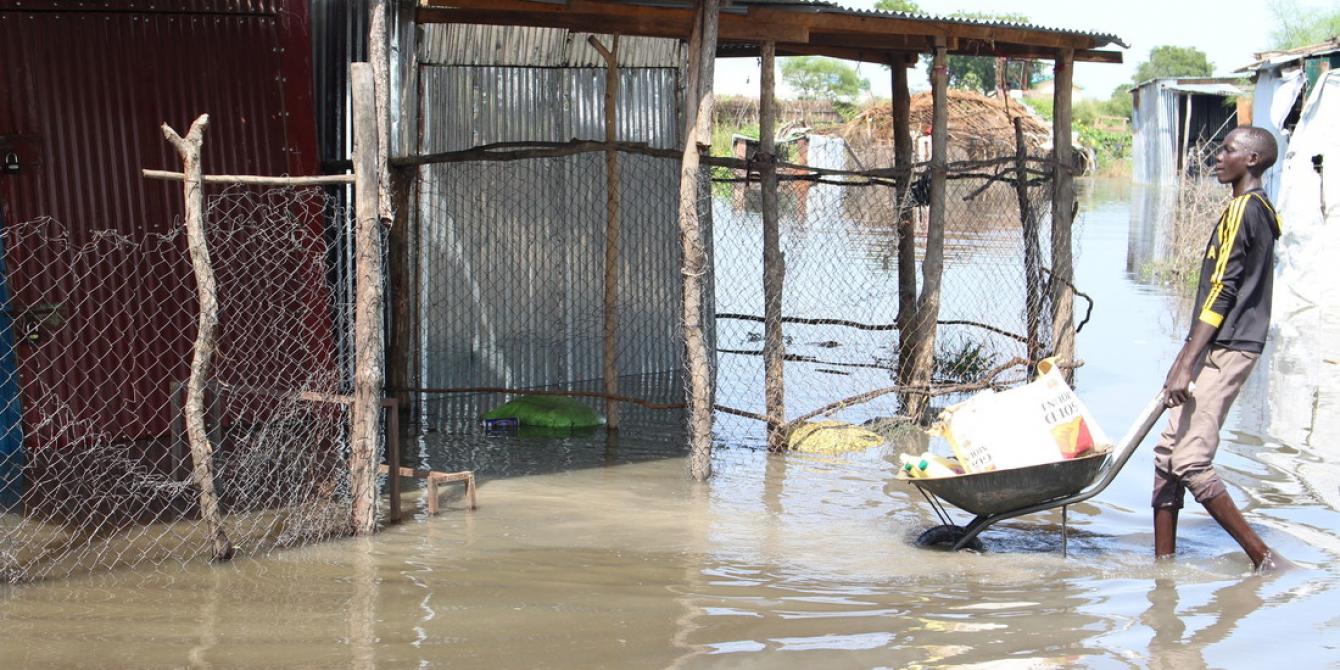
Trade is exceptionally difficult in the rainy season, as roads become impassable. Photo by Tim Bierley/Oxfam
Millions hit by floods, locusts, and coronavirus require massive social safety nets
Millions of people in the Horn, East and Central Africa (HECA) region are at risk of increased hunger and poverty due to the triple threat of floods, locusts and coronavirus. There is an urgent need for increased safety nets, especially cash grants, to help people survive.
The floods and the next wave of locust infestation will lead to increased food shortages in a region where over 33 million people are already severely food insecure. The economic fall-out from governments’ efforts to contain the pandemic is already raising even greater alarm and is likely to push more people into poverty due to the limited capacity to absorb the economic shock from the multiple crises.
Kenya and Uganda have both received large loans from International Monetary Fund (IMF) to support their responses to the pandemic, including the expansion of social protection programs. Even so, more donor support and debt relief must be forthcoming.
In the region, this is the highest rainfall recorded in 40 years. It has caused severe flooding which has killed over 400 people, forced half a million people from their homes and destroyed crops and livelihoods. The heavy rains have also created the perfect conditions for the breeding and spreading of the third wave of locusts, raising fears that the number of locusts could increase 400 times when the next generation hatch in June 2020.
At the same time, restrictions introduced by governments to contain coronavirus have hampered efforts to halt the spread of the locusts with planes and it is making it increasingly more difficult to spray pesticides in key breeding areas. The economic fallout of the restrictions has also led to increased poverty as most people, especially women in the informal economy are unable to work and have no safety net to fall back on, with hikes in food prices in some places.
New swarms, which will mature in June during the annual long rains season from March to May, will affect June harvest, especially in Ethiopia, Kenya, and Somalia. If the swarms are not mitigated, future generations would have the capacity to consume between 80% and 100% of farmers’ crops. Ismael Muhammad from the Somali region Ethiopia around Jijiga town was affected during the second wave of locusts. “They came with the wind from over the mountains, they left us with nothing to eat for the coming months. We must bring our cattle far away to find them grass. Life used to be good with enough to eat for all of us but now we are just surviving, I don’t know how much longer we can survive,” said Ismael.
Locust infested corn crops. Photo by Elena Heatherwick / Oxfam.Oxfam and its partners in HECA are helping curb the spread of locusts and coronavirus and assisting farmers in Kenya, Ethiopia, and Somalia to overcome the floods. We are working closely with our local partners, providing cash assistance to over 6000 households so that they can buy food. We are also distributing soap, hygiene kits and clean water to hospitals and communities.
Oxfam working in delivering COVID-19 messages on the disease’s transmission, symptom and preventions methods to refugee community using loudspeaker in Nguenyyiel camp Gambella, Ethiopia. Along the messaging, proper handwashing demonstration is conducted using handwashing station attached to the vehicle. Nyadol Tut (16) taking part in handwashing demonstration while listening to messages on COVID-19. Photo by Kidane Badeg / Oxfam.Our staff have been increasing public awareness to help prevent the spread of coronavirus, including the training of doctors and nurses– which circulate coronavirus awareness audio messages in local languages with megaphones in rural villages.
A good case in point is the coronavirus call centre in Hargeisa, Somaliland (see video below). Shaqadoon, in collaboration with the Ministry of Health in Somaliland and Oxfam, established the call centre that shares information related to the virus and how the community can protect themselves. It collects information and queries from people on coronavirus. This two-way communication system is encouraging the community to engage and call the centre whenever they need any information or if they feel sick. The centre has received over 650,000 calls since its establishment in mid-April.
To overcome some of the lockdown challenges, Oxfam is scaling up a number of innovations including working with mobile operators to supply e-vouchers for soap and water through “water ATMs” (pre-paid machines that dispense water to the most vulnerable communities) and electronic cash distribution. We have also developed a mobile GPS app that enables community volunteers to record data on local locust infestations, to be shared with government response teams.
Oxfam is calling for almost $46 million to help scale up its humanitarian operations in the region and help almost three million people with lifesaving help. Short-term humanitarian assistance will not be enough to alleviate destitution. Communities experiencing the triple threat need more stable, longer term government assistance that helps transform their underlying needs. We remain committed to supporting governments to scale up social protection systems and to ensuring support reaches those who most need it, in an inclusive, transparent, and accountable way.

.JPG?itok=sW9XXR9A)


 Follow us on Facebook
Follow us on Facebook Follow us on Twitter
Follow us on Twitter